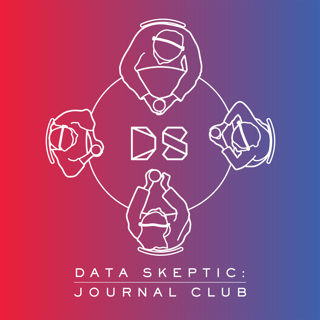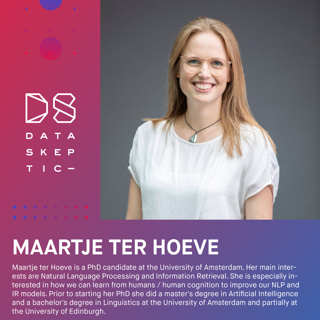
Automatic Summarization
Maartje ter Hoeve, PhD Student at the University of Amsterdam, joins us today to discuss her research in automated summarization through the paper "What Makes a Good Summary? Reconsidering the Focus of Automatic Summarization." Works Mentioned "What Makes a Good Summary? Reconsidering the Focus of Automatic Summarization." by Maartje der Hoeve, Juilia Kiseleva, and Maarten de Rijke Contact Email: m.a.terhoeve@uva.nl Twitter: https://twitter.com/maartjeterhoeve Website: https://maartjeth.github.io/#get-in-touch
29 Jan 202127min
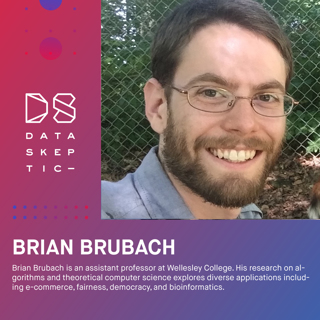
Gerrymandering
Brian Brubach, Assistant Professor in the Computer Science Department at Wellesley College, joins us today to discuss his work "Meddling Metrics: the Effects of Measuring and Constraining Partisan Gerrymandering on Voter Incentives". WORKS MENTIONED: Meddling Metrics: the Effects of Measuring and Constraining Partisan Gerrymandering on Voter Incentives by Brian Brubach, Aravind Srinivasan, and Shawn Zhao
22 Jan 202134min
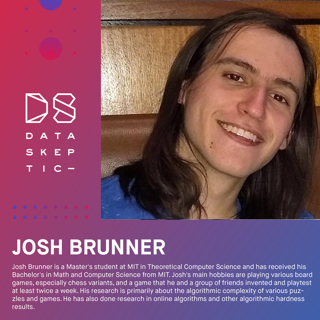
Even Cooperative Chess is Hard
Aside from victory questions like "can black force a checkmate on white in 5 moves?" many novel questions can be asked about a game of chess. Some questions are trivial (e.g. "How many pieces does white have?") while more computationally challenging questions can contribute interesting results in computational complexity theory. In this episode, Josh Brunner, Master's student in Theoretical Computer Science at MIT, joins us to discuss his recent paper Complexity of Retrograde and Helpmate Chess Problems: Even Cooperative Chess is Hard. Works Mentioned Complexity of Retrograde and Helpmate Chess Problems: Even Cooperative Chess is Hard by Josh Brunner, Erik D. Demaine, Dylan Hendrickson, and Juilian Wellman 1x1 Rush Hour With Fixed Blocks is PSPACE Complete by Josh Brunner, Lily Chung, Erik D. Demaine, Dylan Hendrickson, Adam Hesterberg, Adam Suhl, Avi Zeff
15 Jan 202123min
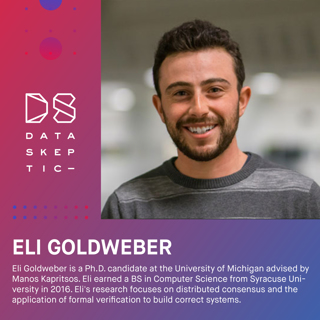
Consecutive Votes in Paxos
Eil Goldweber, a graduate student at the University of Michigan, comes on today to share his work in applying formal verification to systems and a modification to the Paxos protocol discussed in the paper Significance on Consecutive Ballots in Paxos. Works Mentioned : Previous Episode on Paxos https://dataskeptic.com/blog/episodes/2020/distributed-consensus Paper: On the Significance on Consecutive Ballots in Paxos by: Eli Goldweber, Nuda Zhang, and Manos Kapritsos Thanks to our sponsor: Nord VPN : 68% off a 2-year plan and one month free! With NordVPN, all the data you send and receive online travels through an encrypted tunnel. This way, no one can get their hands on your private information. Nord VPN is quick and easy to use to protect the privacy and security of your data. Check them out at nordvpn.com/dataskeptic
11 Jan 202130min

Visual Illusions Deceiving Neural Networks
Today on the show we have Adrian Martin, a Post-doctoral researcher from the University of Pompeu Fabra in Barcelona, Spain. He comes on the show today to discuss his research from the paper "Convolutional Neural Networks can be Deceived by Visual Illusions." Works Mentioned in Paper: "Convolutional Neural Networks can be Decieved by Visual Illusions." by Alexander Gomez-Villa, Adrian Martin, Javier Vazquez-Corral, and Marcelo Bertalmio Examples: Snake Illusions https://www.illusionsindex.org/i/rotating-snakes Twitter: Alex: @alviur Adrian: @adriMartin13 Thanks to our sponsor! Keep your home internet connection safe with Nord VPN! Get 68% off plus a free month at nordvpn.com/dataskeptic (30-day money-back guarantee!)
1 Jan 202133min

Earthquake Detection with Crowd-sourced Data
Have you ever wanted to hear what an earthquake sounds like? Today on the show we have Omkar Ranadive, Computer Science Masters student at NorthWestern University, who collaborates with Suzan van der Lee, an Earth and Planetary Sciences professor at Northwestern University, on the crowd-sourcing project Earthquake Detective. Email Links: Suzan: suzan@earth.northwestern.edu Omkar: omkar.ranadive@u.northwestern.edu Works Mentioned: Paper: Applying Machine Learning to Crowd-sourced Data from Earthquake Detective https://arxiv.org/abs/2011.04740 by Omkar Ranadive, Suzan van der Lee, Vivan Tang, and Kevin Chao Github: https://github.com/Omkar-Ranadive/Earthquake-Detective Earthquake Detective: https://www.zooniverse.org/projects/vivitang/earthquake-detective Thanks to our sponsors! Brilliant.org Is an awesome platform with interesting courses, like Quantum Computing! There is something for you and surely something for the whole family! Get 20% off Brilliant Premium at http://brilliant.com/dataskeptic
25 Des 202029min

Byzantine Fault Tolerant Consensus
Byzantine fault tolerance (BFT) is a desirable property in a distributed computing environment. BFT means the system can survive the loss of nodes and nodes becoming unreliable. There are many different protocols for achieving BFT, though not all options can scale to large network sizes. Ted Yin joins us to explain BFT, survey the wide variety of protocols, and share details about HotStuff.
22 Des 202035min

Alpha Fold
Kyle shared some initial reactions to the announcement about Alpha Fold 2's celebrated performance in the CASP14 prediction. By many accounts, this exciting result means protein folding is now a solved problem. Thanks to our sponsors! Brilliant is a great last-minute gift idea! Give access to 60 + interactive courses including Quantum Computing and Group Theory. There's something for everyone at Brilliant. They have award-winning courses, taught by teachers, researchers and professionals from MIT, Caltech, Duke, Microsoft, Google and many more. Check them out at brilliant.org/dataskeptic to take advantage of 20% off a Premium memebership. Betterhelp is an online professional counseling platform. Start communicating with a licensed professional in under 24 hours! It's safe, private and convenient. From online messages to phone and video calls, there is something for everyone. Get 10% off your first month at betterhelp.com/dataskeptic
11 Des 202023min
